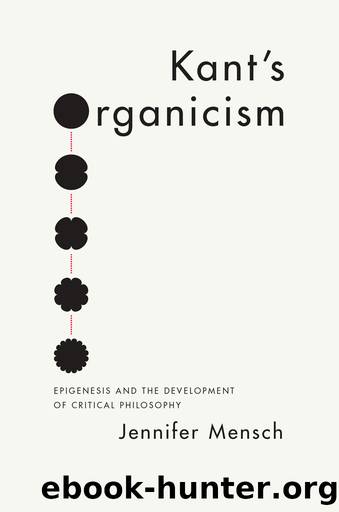Kant's Organicism by Mensch Jennifer;

Author:Mensch, Jennifer; [Mensch, Jennifer]
Language: eng
Format: epub
Publisher: University of Chicago Press
Published: 2013-07-14T16:00:00+00:00
The Transcendental Deduction: The Bauplan at Work
If Kant’s conception of reason as the ground of unity—as ground of the unity of its history, of its faculties, and of experience itself—called to mind botanical images for him, the discussion of cognition was located in the vocabularies of origin and birth. It was therefore no accident that Kant deemed the centerpiece of his theory to be the transcendental deduction, for within the contemporary legal domain, a “deduction” was used primarily for determining questions of birthright and inheritance. As far as it would be positioned in the Critique of Pure Reason, the deduction was meant to trace the intellectual concepts to their point of origin in order to demonstrate their rightful application to experience. In terms borrowed from the court system, Kant thus explained, “Jurists, when speaking of rights and claims, distinguish in a legal action the question of right [quid juris] from the question of fact [quid facti]; and they demand that both be proved. Proof of the former, which has to state the right or the legal claim, they entitle the deduction” (A84/B117). In a legal deduction, research into genealogical lines—that is, discovering a certificate of birth in response to the question of fact—was the first step in proving the rights of a claimant. Distinguishing between competing claimants in order to determine rightful inheritance in response to the question of right was the second step of the investigation, and the summary presentation of the proof of rightful inheritance—a presentation that necessarily included the results of the first step’s investigation into birthright—was referred to altogether as the legal “deduction” of a given claimant’s rights.
But while this legal model seemed to set up the clearly defined stages of a relatively uncomplicated two-step procedure, Kant’s actual proof of the rights to be granted the categories with respect to experience was less direct. Indeed, it would ultimately circle back upon itself insofar as a separate, deeper investigation into the birthplace of cognition as a whole was needed in order to declare reason the ultimate guarantor of any rights being later claimed by the categories themselves. In Kant’s version of the deduction, therefore, the question of fact would ultimately be required to secure the question of right, and this was the case despite Kant’s protestations regarding the relative independence and priority of the latter investigation.
The dominating significance of the quid facti for Kant’s argument was not immediately obvious to Kant’s readers as they attempted to follow the linear progression of the deduction itself. Part of this had to do with Kant’s decision to follow the legal model in distinguishing the two steps of his own investigation in terms of an initial inquiry into the origin of the categories, the so-called metaphysical deduction, and a subsequent proof of their necessity for experience in the transcendental deduction. But this division of labor between sections devoted to the origin of the categories on the one hand and their application to experience on the other was not the only problem
Download
This site does not store any files on its server. We only index and link to content provided by other sites. Please contact the content providers to delete copyright contents if any and email us, we'll remove relevant links or contents immediately.
The remains of the day by Kazuo Ishiguro(8383)
Tools of Titans by Timothy Ferriss(7810)
Giovanni's Room by James Baldwin(6808)
The Black Swan by Nassim Nicholas Taleb(6762)
Inner Engineering: A Yogi's Guide to Joy by Sadhguru(6439)
The Way of Zen by Alan W. Watts(6288)
Asking the Right Questions: A Guide to Critical Thinking by M. Neil Browne & Stuart M. Keeley(5355)
The Power of Now: A Guide to Spiritual Enlightenment by Eckhart Tolle(5330)
The Six Wives Of Henry VIII (WOMEN IN HISTORY) by Fraser Antonia(5235)
Astrophysics for People in a Hurry by Neil DeGrasse Tyson(5000)
12 Rules for Life by Jordan B. Peterson(4160)
Housekeeping by Marilynne Robinson(4059)
The Ethical Slut by Janet W. Hardy(4036)
Skin in the Game by Nassim Nicholas Taleb(3965)
Double Down (Diary of a Wimpy Kid Book 11) by Jeff Kinney(3922)
Ikigai by Héctor García & Francesc Miralles(3889)
The Art of Happiness by The Dalai Lama(3844)
Skin in the Game: Hidden Asymmetries in Daily Life by Nassim Nicholas Taleb(3720)
Walking by Henry David Thoreau(3681)
